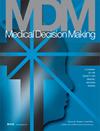Adaptation and Validation of the Psychological Consequences of Screening Questionnaire (PCQ) for Cognitive Screening in Primary Care.
IF 3.1
3区 医学
Q2 HEALTH CARE SCIENCES & SERVICES
引用次数: 0
Abstract
BACKGROUND Context-specific measures with adequate external validity are needed to appropriately determine psychosocial effects related to screening for cognitive impairment. METHODS Two-hundred adults aged ≥65 y recently completing routine, standardized cognitive screening as part of their Medicare annual wellness visit were administered an adapted version of the Psychological Consequences of Screening Questionnaire (PCQ), composed of negative (PCQ-Neg) and positive (PCQ-Pos) scales. Measure distribution, acceptability, internal consistency, factor structure, and external validity (construct, discriminative, criterion) were analyzed. RESULTS Participants had a mean age of 73.3 y and were primarily female and socioeconomically advantaged. Most had a normal cognitive screening result (99.5%, n = 199). Overall PCQ scores were low (PCQ-Neg: x¯= 1.27, possible range 0-36; PCQ-Pos: x¯ = 7.63, possible range 0-30). Both scales demonstrated floor effects. Acceptability was satisfactory, although the PCQ-Pos had slightly more item missingness. Both scales had Cronbach alphas >0.80 and a single-factor structure. Spearman correlations between the PCQ-Neg with general measures of psychological distress (Impacts of Events Scale-Revised, Perceived Stress Scale, Kessler Distress Scale) ranged from 0.26 to 0.37 (P's < 0.001); the correlation with the World Health Organization-Five Well-Being Index was -0.19 (P < 0.01). The PCQ-Neg discriminated between those with and without a self-reported subjective cognitive complaint (x¯ = 2.73 v. 0.89, P < 0.001) and was associated with medical visit satisfaction (r = -0.24, P < 0.001) on the Patient Satisfaction Questionnaire. The PCQ-Pos predicted self-reported willingness to engage in future screening (x¯ = 8.00 v. 3.00, P = 0.03). CONCLUSIONS The adapted PCQ-Neg is an overall valid measure of negative psychological consequences of cognitive screening; findings for the PCQ-Pos were more variable. Future studies should address measure performance among diverse samples and those with abnormal screening results. HIGHLIGHTS The PCQ scale is an overall valid measure of psychological dysfunction related to cognitive screening in older adults receiving normal screen results.PCQ scale performance should be further validated in diverse populations and those with abnormal cognitive screening results.The adapted PCQ may be useful to both health research and policy stakeholders seeking improved assessment of psychological impacts of cognitive screening.改编并验证用于初级保健认知筛查的筛查心理后果问卷 (PCQ)。
方法对 200 名年龄≥65 岁、最近完成常规标准化认知筛查(作为医疗保险年度健康检查的一部分)的成年人进行了筛查心理后果问卷 (PCQ) 的改编版测试,该问卷由消极(PCQ-Neg)和积极(PCQ-Pos)两个量表组成。对量表的分布、可接受性、内部一致性、因子结构和外部效度(建构效度、区分效度和标准效度)进行了分析。结果参与者的平均年龄为 73.3 岁,主要为女性,社会经济地位较高。大多数人的认知筛查结果正常(99.5%,n = 199)。PCQ 总分较低(PCQ-Neg:x¯= 1.27,可能范围 0-36;PCQ-Pos:x¯= 7.63,可能范围 0-30)。两个量表均显示出底限效应。可接受性令人满意,但 PCQ-Pos 的缺失项目略多。两个量表的 Cronbach alphas 均大于 0.80,且均为单因素结构。PCQ-Neg与一般心理压力测量(事件影响量表-修订版、感知压力量表、凯斯勒压力量表)之间的斯皮尔曼相关性为0.26至0.37(P<0.001);与世界卫生组织-五项幸福指数之间的相关性为-0.19(P<0.01)。PCQ-Neg可区分有主观认知主诉和无主观认知主诉的患者(x¯ = 2.73 v. 0.89,P < 0.001),并与患者满意度问卷中的就诊满意度相关(r = -0.24,P < 0.001)。PCQ-Pos预测了自我报告的未来筛查意愿(x¯ = 8.00 v. 3.00, P = 0.03)。结论:改编后的PCQ-Neg是认知筛查负面心理后果的总体有效测量方法;PCQ-Pos的结果变化较大。PCQ量表的性能应在不同人群和认知筛查结果异常的人群中进一步验证。改编后的PCQ可能对寻求改善认知筛查心理影响评估的健康研究和政策利益相关者有用。
本文章由计算机程序翻译,如有差异,请以英文原文为准。
求助全文
约1分钟内获得全文
求助全文
来源期刊

Medical Decision Making
医学-卫生保健
CiteScore
6.50
自引率
5.60%
发文量
146
审稿时长
6-12 weeks
期刊介绍:
Medical Decision Making offers rigorous and systematic approaches to decision making that are designed to improve the health and clinical care of individuals and to assist with health care policy development. Using the fundamentals of decision analysis and theory, economic evaluation, and evidence based quality assessment, Medical Decision Making presents both theoretical and practical statistical and modeling techniques and methods from a variety of disciplines.
 求助内容:
求助内容: 应助结果提醒方式:
应助结果提醒方式:


